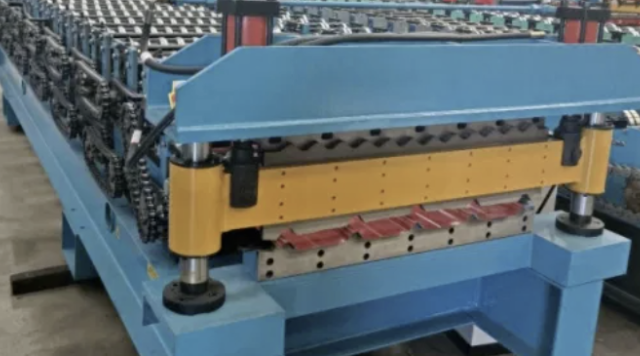
Posted on Friday, November 1, 2024
The Nigerian roll forming market has witnessed consistent growth in recent years, driven by the construction boom, infrastructure projects, and expansion of industries such as manufacturing and agriculture. One critical aspect for buyers in this market is selecting the correct profile types that meet the specific demands of Nigerian industries. From roofing sheets to wall panels and structural profiles, each type serves a unique purpose. This blog will explore the most common profiles used in Nigeria, their industry applications, and essential considerations for choosing the right profiles.
Roofing profiles are among the most popular roll-formed products in Nigeria. Known for their durability and cost-effectiveness, these profiles are widely used in residential, commercial, and industrial construction.
Wall panels are versatile and essential for both residential and industrial buildings. In Nigeria, where the climate can vary significantly, wall panels provide insulation and structural support.
Structural profiles, such as C and Z purlins, play a crucial role in construction, especially in framing and structural applications. These profiles are integral in supporting roofing systems and are also used in the framing of commercial buildings.
The demand for these profiles in Nigeria spans several sectors, each with unique requirements.
The construction sector is the largest consumer of roll-formed profiles, using them extensively for roofing, cladding, and framing. Roofing sheets are essential in this sector, providing protection from the elements while offering an aesthetic touch to buildings. Wall panels and structural profiles are crucial in creating strong, durable structures that meet local building codes and climate conditions.
In manufacturing, profiles are used for a variety of purposes, from machinery housing to protective barriers. Industrial wall cladding is particularly valuable for manufacturing facilities as it protects buildings from wear and tear due to heavy machinery and chemical processes. Additionally, structural profiles, such as purlins, provide support to large manufacturing plants, ensuring safety and durability.
Agricultural buildings, including storage facilities, barns, and protective structures, also rely heavily on roll-formed profiles. Insulated panels are ideal for food storage facilities as they help maintain a stable temperature, which is essential for preserving agricultural products. Corrugated sheets are commonly used for agricultural sheds and barns, providing a durable and cost-effective solution.
Selecting the right profile for a specific application involves several factors, including durability, cost, and compatibility with Nigeria’s infrastructure.
Nigeria’s climate can be harsh, with heavy rains and high temperatures. Corrugated sheets, which are highly resistant to weather changes, are often preferred for roofing in rural and coastal areas. Meanwhile, structures in humid or rainy regions may benefit from insulated panels that provide better resistance against rust and corrosion.
For many Nigerian businesses, cost-effectiveness is a primary consideration. Trapezoidal roofing sheets, which offer both durability and aesthetic appeal, are popular for buyers seeking value for money in urban areas. Used roll-forming machines can also be a cost-effective option for those looking to manage budget constraints.
Given that power supply requirements vary across the country, buyers must ensure that the roll-forming machines they purchase are compatible with the local power grid. Machines that operate efficiently on a variety of power supplies are ideal for Nigerian businesses, which may face power fluctuations. Selecting energy-efficient machinery can further reduce costs and enhance productivity.
ABC Construction Ltd., a leading construction company in Lagos, recently completed a large-scale commercial project using a combination of trapezoidal roofing sheets and insulated wall panels. The company required materials that could withstand Lagos’s humid climate while providing a modern appearance. They chose trapezoidal sheets for their durability and aesthetics and installed insulated wall panels to help maintain indoor temperatures and reduce energy costs. This project highlights how choosing the right profiles can enhance both functionality and efficiency, meeting industry-specific needs effectively.
As Nigeria’s demand for roll-formed products continues to grow, understanding the applications of various profile types becomes increasingly important. From roofing sheets to structural profiles, each profile offers unique benefits tailored to specific industries. By considering durability, cost efficiency, and power supply compatibility, buyers in Nigeria can make informed decisions that best suit their needs. Selecting the right profile is more than just a technical decision—it’s an investment in the future, contributing to the growth and success of Nigerian industries.

Used Purlin Roll Forming Machines for Sale Worldwide
Posted on Sunday, January 25, 2026
Pre-Owned Roll Forming Machines for Purlin & Structural Steel Profiles

Used Roof Panel Roll Forming Machines for Sale Worldwide
Posted on Sunday, January 25, 2026
Pre-Owned Roll Forming Machines for Roofing Panel Production

Used Roll Forming Machines for Sale Worldwide
Posted on Tuesday, January 20, 2026
Pre-Owned Roll Forming Machines with Inspection, Verification & Global Support

Steel Coil Supply for Roll Forming Machines Worldwide
Posted on Tuesday, January 20, 2026
Reliable Steel Coil Supply for Roll Forming, Fabrication & Manufacturing Applications
Copyright 2026 © Machine Matcher.